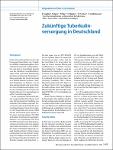Zukünftige Tuberkulinversorgung in Deutschland
Sagebiel, Daniel
Hauer, Barbara
Haas, Walter
Magdorf, Klaus
Priwitzer, M.
Loddenkemper, Robert
Der Hersteller des einzigen bisher in Deutschland für Intradermaltests nach Mendel-Mantoux verwendeten Tuberkulins, die Firma Chiron Vaccines Behring, hat 2004 kurzfristig die Produktion von Tuberkulin Behring GT (GT=gereinigtes Tuberkulin) eingestellt. Anfang 2005 waren die Bestände an GT 10 bereits erschöpft, geringe Restbestände existierten noch für die Dosierungen GT 100 und GT 1000. Als Übergangslösung wurde von Chiron Vaccines Behring der Import des von Chiron S.r.l. in Siena hergestellten italienischen Tuberkulins Biocine PPD 5 IE lyophil vorgeschlagen. Da es sich um ein in Deutschland nicht zugelassenes Produkt handelt, ist eine Einzelverordnung nach § 73 Abs. 3 Arzneimittelgesetz (AMG) erforderlich. Langfristig will Chiron Vaccines Behring die Versorgung Deutschlands durch in Großbritannien von Chiron Vaccines Evans produziertes Tuberkulin (PPD Evans) ab Sommer 2006 sicherstellen. Problematisch an diesem Vorgehen ist die damit verbundene zweimalige Umstellung auf ein anderes Tuberkulin sowie die ungeklärte Frage der Bioäquivalenz. Als weitere Möglichkeit können, neben den erwähnten Tuberkulinen der Firma Chiron Vaccines, auch das von der Weltgesundheitsorganisation (WHO) als Standardtuberkulin empfohlene und in vielen europäischen Ländern bereits eingeführte Tuberkulin PPD RT23 SSI des Statens Serum Institut (Kopenhagen, Dänemark) sowie andere Tuberkuline, wie beispielsweise das in den USA verwendete Tubersol (PPD CT68), importiert werden. Zusammen mit dem Robert Koch-Institut (RKI) und dem Paul-Ehrlich-Institut (PEI) bemüht sich das Deutsche Zentralkomitee zur Bekämpfung der Tuberkulose (DZK) intensiv um eine Problemlösung, da eine kontinuierliche Tuberkulinversorgung Deutschlands zu diagnostischen Zwecken und auch im Rahmen von Umgebungsuntersuchungen zwingend notwendig ist. Angestrebtes Ziel sollte zudem die Verwendung eines einheitlichen Tuberkulins in allen Regionen sein, da ansonsten ein standardisiertes Vorgehen und die Vergleichbarkeit auf nationaler Ebene gefährdet sind. Geschätzt kann zukünftig von einem jährlichen Bedarf von etwa 2 Millionen Tuberkulintestdosen für Deutschland ausgegangen werden. Das Statens Serum Institut prüft derzeit die Möglichkeit einer Antragstellung auf Zulassung des PPD RT 23 SSI in Deutschland. Chiron Vaccines Behring teilt mit, dass es keine Zulassung für das Biocine-Tuberkulin anstrebt, hat aber die Absicht, eine Zulassung für das Tuberkulin PPD Evans in Deutschland zu beantragen. Sanofi Pasteur MSD hat derzeit keine Absicht, eine Mendel-Mantoux-Testsubstanz [wie z. B. Tubersol (PPD CT68)] zur Zulassung auf dem deutschen Markt anzumelden. Bis in Deutschland wieder ein zugelassenes Tuberkulin zur Verfügung steht, wäre es, insbesondere in Fällen, in denen ein Lagerbestand an Tuberkulin unverzichtbar ist, wie beispielsweise im öffentlichen Gesundheitsdienst und in Krankenhausapotheken, überaus hilfreich, wenn eine Ausnahmeregelung für den Import erwirkt werden könnte. The manufacturers of the only tuberculin available up to now in Germany for intradermal TB tests according to Mantoux, Chiron Vaccines Behring, in 2004 unexpectedly stopped the production of the tuberculin Behring GT (GT=gereinigtes Tuberkulin—purified protein derivative tuberculin). Only residual stocks were sold during the preceding months. The stocks of GT 10 were already depleted at the beginning of 2005, while there are small supplies left of GT 100 and GT 1000. As a temporary solution, Chiron Vaccines Behring is offering to import the Italian tuberculin Biocine PPD 5 IE lyophil produced by Chiron S.r.l. in Siena. As this is not licensed for sale in Germany, it is necessary to obtain an exceptional prescription (Einzelverordnung) according to § 73 (3) of the Federal Law Relating to the Manufacture and Distribution of Medicine (Arzneimittelgesetz, AMG). In the long term, Chiron Vaccines Behring plan to secure the supply of tuberculin in Germany by importing, starting in the summer of 2006, the tuberculin produced by Chiron Vaccines Evans in the UK (PPD Evans). However, these plans involve changing over to a different type of tuberculin twice within a very short period of time. Another problem is the unresolved issue of bioequivalence. Besides the above-mentioned tuberculins produced by Chiron Vaccines, a further possibility would be the import of the tuberculin PPD RT23 SSI of the Statens Serums Institute (Copenhagen/Denmark), which is recommended by the World Health Organization (WHO) as the standard tuberculin and which has already been introduced in several European countries, or of other tuberculins such as Tubersol (PPD CT68), which is used in the US. Together with the Robert Koch Institute (RKI) and the Paul Ehrlich Institute (PEI), the German Central Committee against Tuberculosis (DZK) is striving to find a solution, in view of the urgent need for an uninterrupted supply of tuberculin in Germany for diagnostic purposes and contact tracing. A uniform tuberculin should be used in all German regions as a basis to secure a standardized testing procedure and national comparability of test results. The estimated annual requirement for Germany is two million tuberculin test doses. The Statens Serum Institute is currently evaluating the possibility of licensing PPD RT23 SSI in Germany. Chiron Vaccines Behring communicated that it is not aiming to have the Biocine tuberculin licensed for Germany but intends to apply for a license for the tuberculin PPD Evans. Sanofi Pasteur MSD at this point does not intend to have a tuberculin like Tubersol (PPD CT68) licensed for Germany. Until a licensed tuberculin is again available in Germany, it would be very useful if, especially in settings where stocks of tuberculin are essential (e.g. public health services or hospital dispensaries), an exceptional import license could be obtained.
No license information

